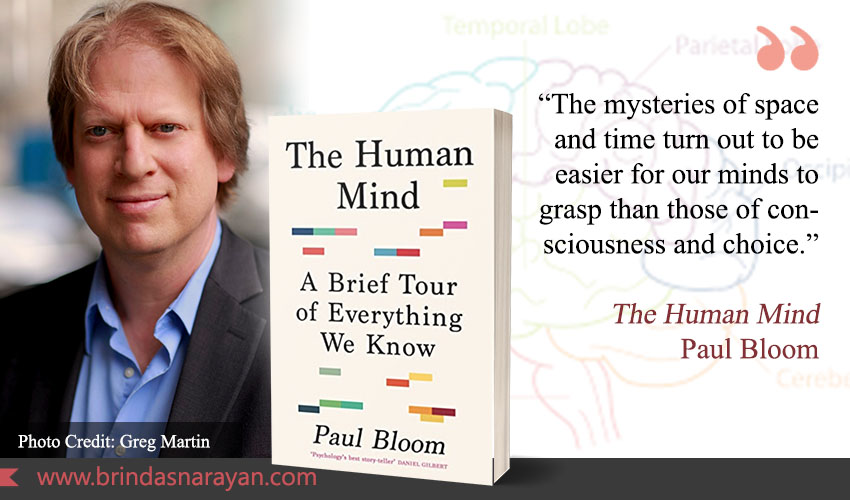
Revisiting The Mind With an Expert
Paul Bloom has achieved something that many academics might hanker for but rarely attain: popularity. Not just among students at the University – currently the University of Toronto, and earlier, for 21 years, Yale – at which he teaches, but also with Internet nerds. His Introduction to Psychology has drawn millions to its open course shores, reinforcing the Kantian quote that Bloom cites in his book: “Two things fill the mind with ever new and increasing admiration and awe, the more often and more steadily we reflect upon them: the starry heavens above me and the moral law within me.”
This is a book that dwells on questions that might have occurred to any human being, to anyone who might conceive of themselves as possessing or being possessed by a mind. Bloom lays out some of the questions he hopes to answer. How does an unimpressive hunk of meat contained inside the human skull generate something as baffling and magical as consciousness? Or based on the latest research, are there any valid takeaways from erstwhile psychologists, Sigmund Freud or B.F. Skinner? How do our prejudices – both explicit and implicit – shape our view of the world?
He acknowledges straightaway that certain aspects of modern psychology may not appeal to some thinkers. After all, the discipline tends to adopt a materialist, evolutionary and causal construct of the self and reality, which can be odds with those who subscribe to supernatural beliefs. In an age when intelligence and creativity are being mechanically simulated by humming servers – like in ChatGPT and GPT 4.0 – the absence of a “soul” can aggravate human despondence.
To bolster interest in those who might switch off from the field at this point, Bloom adds a cheery caveat to this thought. We might be “soft machine[s]” as John Updike puts it in Rabbit at Rest, but not “just soft machines.” The one thing that can tug curious readers is this: we still know so little about the brain. Surely, nothing is more compelling than an ongoing mystery?
All It Takes Is a Synaptic Snap
Those of us who would like to invest ourselves with certain attributes – curious, or calm, or buoyant – would be unsettled by the notion that our personalities rest on very shaky foundations. All it takes is an accident, a stumble on the pavement, an aneurysm or a synaptic snap to lose control of our core selves.
Take the case of Phineas Gage, a foreman who was the victim of an explosion in 1848. An iron rod rammed through his skull and into his brain, leaving him alive and conscious but permanently altered. Where earlier he was a reliable worker with moderate habits, he was now irreverent, constantly hurling profanities.
In an article titled “The Last Hippie,” the neurologist Oliver Sacks dwells on Greg F., a Hare Krishna follower, who had moved away from his family to reside at a temple in New Orleans. Gradually, Greg started losing his sight. He also seemed calmer and happier. Someone in the Order kept citing this as an example of spiritual growth.
One day, his parents visited and were aghast. Their one-time lean and hairy son was much bulkier and hairless. More disturbingly, he always wore a dopey smile on his face like he didn’t really absorb his environs. Eventually, doctors discovered a tumor in his brain that was the size of an orange. Despite a surgery, his short and long-term memories were affected.
Materialist or Dualist?
Francis Crick calls our inescapable reliance on biology the Astonishing Hypothesis: “You, your joys and your sorrows, your memories and your ambitions, your sense of personal identity and free will, are in fact no more than the behavior of a vast assembly of nerve cells and their associated molecules.” Charles Darwin put it more succinctly: “Brain makes thought.”
Crick and Darwin were supporters of materialism – believing that everything had physical underpinnings and that we are not anything but our bodies. Rene Descartes however subscribed to a dualist viewpoint, contending that we have bodies and souls (or minds). Descartes’ reasoning is supported by most religious and spiritual thinkers, and even by philosophers like Plato. Some modern neuroscientists also subscribe to a dualist view, because after years and years of digging into the brain, they haven’t found a “substance” or mechanism that explains consciousness.
Whether the Higher Force is good (like a God) or evil (like Satan) or just dispassionate (like the sun), these thinkers are convinced that we are brains in a vat, rather than free-floating brains with our own willful paths.
Unraveling The Seat of Consciousness
Metaphysics aside, where do thoughts and feelings originate? Despite ancient notions about the “heart” being the seat of emotions, modern science establishes that thoughts originate in the brain. In the firing of our approximately 86 billion neurons, which lead in turn to trillions of connections. As Bloom writes: “This is what thinking is, then: neurons talking to other neurons vis neurotransmitters.”
It doesn’t escape scientists that the study of brains by brains is ironic. As the physicist Emerson M Pugh noted: “If the human brain were so simple that we could understand it, we would be so simple that we couldn’t.” Emo Phillips, a comedian, put it best: “I used to think that the brain was the most wonderful organ in my body. Then I realized who was telling me this.”
References
Paul Bloom, The Human Mind: A Brief Tour of Everything We Know, Vintage Digital, 2023




